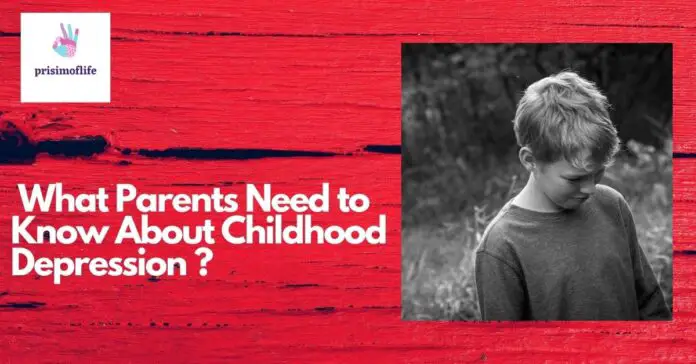Have you ever wondered what Parents Need to Know About Childhood Depression? If not, then this article is for you. Childhood depression isn’t as rare as many people think, and it may even be more common than adult depression. Although children who are depressed often get better on their own, if they don’t, then treatment options like psychotherapy and medication can help tremendously.
Childhood depression can be hard to spot in young children, who are masters at hiding their emotional issues from adults. To properly care for a child who suffers from depression, you need to know what the typical symptoms are and how to get your child the help they need without hurting your relationship with them in the process. Here are some important things parents should know about childhood depression that could help them decide whether or not to seek treatment for their child.
Don’t Blame Yourself
It’s easy for parents to feel responsible when they learn their child is experiencing depression. The truth is, though, that most of these kids are dealing with a variety of issues in their lives—and even those without any obvious pressures in school or at home can experience depression.
It’s important for parents not to blame themselves and instead try and work with their children. If your family physician isn’t equipped to handle childhood depression cases, be sure to find one who is.
Depression isn’t a Choice
Kids get depressed for all kinds of reasons—stress at school, peer pressure, bullying. But many parents mistakenly think their child’s depression results from bad choices or poor behavior. That’s why nurses need to teach parents about what childhood depression is and how best to treat it.
A growing body of research shows that early intervention makes a big difference in recovery rates. Here are five ways you can educate parents on how best to support their children through recovery.
Recognize Common Symptoms
Children can display several different symptoms of depression, including irritability, anxiety, tearfulness, sleep disturbances, and appetite problems. If you notice your child exhibiting any of these signs—mainly if they don’t go away when treated with proper rest and nutrition—it may be a sign of childhood depression.
Talk to your pediatrician if you believe your child is depressed. They can prescribe medication or other treatment options that will help improve your child’s outlook on life.
Seek Treatment Early
Left untreated, childhood depression can get worse as your child grows up. It can lead to low self-esteem, school problems, drug use and trouble with friends. In severe cases, it can increase their risk of suicide. Make sure you reach out to a pediatrician or mental health specialist if you think your child might be depressed so they can start treatment right away. Early diagnosis and intervention are key when it comes to childhood depression.
Treatment is Effective, but Takes Time
Treating your child’s depression isn’t easy, but it is effective. And while anti-depressants may help jumpstart your child’s recovery, they don’t usually cure depression independently. Be patient and understanding. Your child needs time to heal, which will take some time.
If your child is receiving psychotherapy or counseling in addition to medication for depression, encourage her to attend appointments regularly—and make sure she does so. If she misses appointments consistently or begins missing school or socializing less frequently, speak with her mental health provider about how things are going. If you think your daughter may be abusing alcohol or drugs, see a counselor immediately.
Families Need Support
Children and teens who are battling depression need support from family members. This can come in many forms. For example, parents should ensure their children feel loved and supported—and if your child isn’t comfortable opening up about his or her feelings, you can be a good listener without prying into his or her emotions.
Another important thing for parents is to model healthy coping strategies by dealing with stress in constructive ways, such as exercising regularly and making time for fun activities. Parents might also want to seek professional help through group therapy or counselling sessions with therapists—especially if they feel like they’re struggling with how best to help their child cope with life’s challenges.
Ways to Help Your Child at Home
When you see that your child isn’t acting like his or her usual self, it can be hard not to jump in and take control. However, as a parent, there are steps you can take at home that will help your child get back on track without having too much of an effect on your relationship with them. Focus on positive behaviors and foster a good overall attitude.
Treatments can help reduce anxiety and depression symptoms long term
The primary treatment for childhood depression is psychotherapy. The best evidence suggests that cognitive behavioral therapy (CBT) is effective and can reduce symptoms of anxiety and depression, helping a child learn more effective ways of coping with stress.
However, combining CBT with medications can be even more helpful. A combination of medication and psychotherapy may also help prevent relapse in children whose depression symptoms improve after treatment.
Suggested Article:










